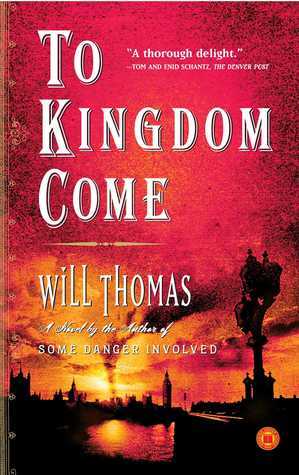 To Kingdom Come (Barker & Llewelyn, #2) by Will Thomas
To Kingdom Come (Barker & Llewelyn, #2) by Will Thomas Format: ebook
Source: purchased from Amazon
Formats available: hardcover, paperback, ebook, audiobook
Genres: historical fiction, historical mystery, mystery
Series: Barker & Llewelyn #2
Pages: 288
Published by Touchstone Books on May 3, 2005
Purchasing Info: Author's Website, Publisher's Website, Amazon, Barnes & Noble, Kobo, Bookshop.org, Better World Books
Goodreads
When a bomb destroys the recently formed Special Irish Branch of Scotland Yard, all fingers point to the increasingly brazen factions of Irish dissidents seeking liberation from English rule. Volunteering their services to the British government, Barker and Llewelyn set out to infiltrate a secret cell of the Irish Republican Brotherhood known as the Invisibles. Posing as a reclusive German bomb maker and his anarchist apprentice, they are recruited for the group's ultimate plan: to bring London to its knees and end the monarchy forever.
Their adventures take them from a lighthouse on the craggy coast of Wales to a Liverpool infested with radicals, and even to the City of Light, where Llewelyn goes undercover with Maire O'Casey, the alluring sister of an Irish radical. Llewelyn again finds himself put to the test by his enigmatic employer, studying the art of self-defense and the brutal sport of hurling -- and, most dangerous of all, being schooled in the deadly science of bomb making.
My Review:
What an explosive treat this book turned out to be!
I’ve started at the end a bit there, but that fits right into the story, as it does too. Not that the beginning of the book tells us much – yet – because it shouldn’t. But does make for every bit as dramatic – and yes explosive – opening as that first sentence.
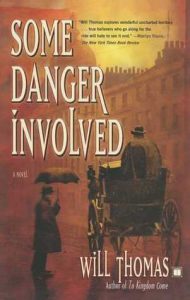 After the events of the first marvelous book in this series, Some Danger Involved, we catch up with Thomas Llewelyn as he’s drowning in the Thames. As we learn later, that’s a fitting metaphor for the entire case, because Llewelyn is in over his head the whole way through.
After the events of the first marvelous book in this series, Some Danger Involved, we catch up with Thomas Llewelyn as he’s drowning in the Thames. As we learn later, that’s a fitting metaphor for the entire case, because Llewelyn is in over his head the whole way through.
So, as Llewelyn extracts himself from his watery predicament, the story loops back so that the reader can discover how he ended up in that particularly messy water. A situation which we are pretty sure he survived, as he is the narrator for this entire series as part of his duties as enquiry agent Cyrus Barker’s assistant.
The case that has brought Llewelyn to this pass is steeped in the true history of the late Victorian era, as London is rocked by bombs planted by the Irish Republican Brotherhood. (Not a typo, the IRB was a predecessor/brother organization to the later IRA). In 1884, when this story took place, Irish Home Rule was a rising question in the House of Commons, “Fenian” terrorism was on the rise, and the Special Irish Branch of the Metropolitan Police, formed in 1882, was tasked with rooting out the terrorists but still getting their boots under them as far as being successful at it.
When Barker and Llewelyn enter this particular case, the area around Scotland Yard – including their own offices – has been cratered by bombs planted by one faction or another of the IRB. Exactly by which faction is caught up in an investigation filled with jurisdictional conflicts between the Met’s Special Branch – whose offices were completely destroyed – and the government’s Home Office department.
Barker throws his – and by extension Llewelyn’s – lives and reputations on the line by promising the Home Office – and by extension the Queen – that he and Llewelyn can infiltrate the IRB, discover the actual perpetrators of the bombings, and set them up for capture by whichever department wins the prize of publicity for their arrest. And that they can get the job done in less than a month – before the date when the bombers have promised a bigger and more explosive round of bombings.
It’s Llewelyn’s first – but probably far from last – attempt to work undercover and play the spy. It’s a difficult task for a man who usually wears his heart on his sleeve. It’s also a hard lesson in keeping his emotions to himself – a lesson at which he fails – and not getting too deep into the part he has to play to survive – even if his heart does not.
Escape Rating A+: Diving into the first book in this series, Some Danger Involved, has turned out to be one of my best reading decisions of the whole, entire year. Now two books in, I’m fully committed to reading the whole series because it’s completely absorbing and consistently awesome.
It also fits right into historical mystery series I’ve previously loved. Not just the obvious echoes of Holmes and Watson, but also to the late Anne Perry’s Charlotte and Thomas Pitt series, to the point where I’m wondering if Thomas Llewelyn’s name is a bit of an homage to Pitt. I invoke Pitt specifically here because Thomas Pitt was also involved with the Special Irish Branch in that series after book 21, The Whitechapel Conspiracy, and became its head before he retired at the end of the series. So those parts of the story felt every bit as familiar as the subtle Holmes and Watson call backs and it made this story that much easier to get stuck into.
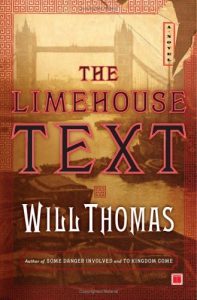 What kept me glued to my seat (as this turned out to be a one-sitting/one-evening read) was the way that it dove head-first both into the heart of its point-of-view character Thomas Llewelyn and into the hearts and motivations of the Irish Republican Brotherhood faction members, and the difficulty that Llewelyn had separating himself from them and his sympathy for their cause even as he decried their methods and worked to bring them down, doing his best to keep them all from being blown “to kingdom come”.
What kept me glued to my seat (as this turned out to be a one-sitting/one-evening read) was the way that it dove head-first both into the heart of its point-of-view character Thomas Llewelyn and into the hearts and motivations of the Irish Republican Brotherhood faction members, and the difficulty that Llewelyn had separating himself from them and his sympathy for their cause even as he decried their methods and worked to bring them down, doing his best to keep them all from being blown “to kingdom come”.
So I fell every bit as deeply into this book as I did to the first book in the series, Some Danger Involved, the title of which is a quote from Barker’s ‘Help Wanted’ advertisement that Llewelyn applied for in that first book. I will most definitely be back for the third book in this series, The Limehouse Text, in the hopes of figuring out what that title has to do with the story, the next time I need a reading break with a bit of body and a compelling mystery adventure.

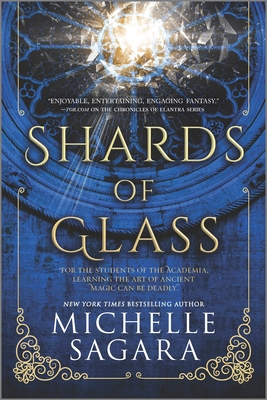 Shards of Glass by
Shards of Glass by  Shards of Glass is a bit of a side story in the marvelously interwoven, intricately-plotted, and long-running
Shards of Glass is a bit of a side story in the marvelously interwoven, intricately-plotted, and long-running 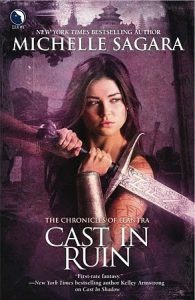 Escape Rating A+: I began reading the
Escape Rating A+: I began reading the 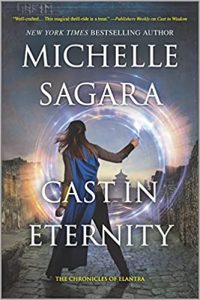 And of course they all turn out to be wrong – and wrong in a way that is buried in the legends of the deep past and will cause catastrophic destruction if they’re not sussed out in time and by the right people.
And of course they all turn out to be wrong – and wrong in a way that is buried in the legends of the deep past and will cause catastrophic destruction if they’re not sussed out in time and by the right people.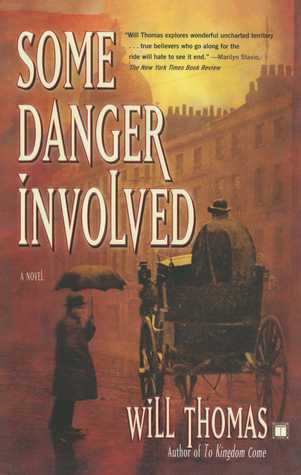 Some Danger Involved (Barker & Llewelyn, #1) by
Some Danger Involved (Barker & Llewelyn, #1) by 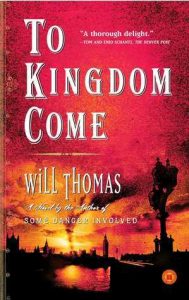 (Although my own family was still spread across Eastern Europe at this time period, I have pictures of my great-grandfather, and this would have been his generation, letting me connect to this story on a deeper level than I expected – which is where those multiple levels of comfort read come comfortably in.)
(Although my own family was still spread across Eastern Europe at this time period, I have pictures of my great-grandfather, and this would have been his generation, letting me connect to this story on a deeper level than I expected – which is where those multiple levels of comfort read come comfortably in.)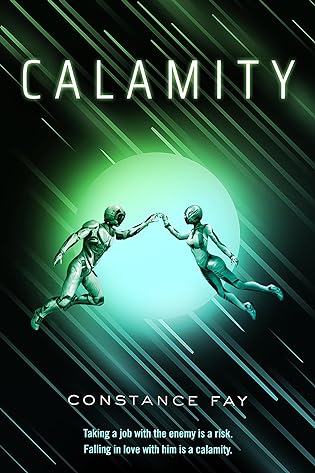 Calamity (Uncharted Hearts, #1) by
Calamity (Uncharted Hearts, #1) by 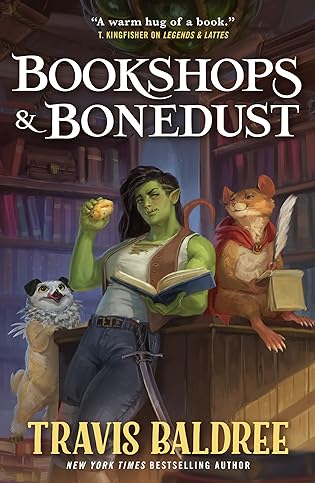 Bookshops & Bonedust (Legends & Lattes, #0) by
Bookshops & Bonedust (Legends & Lattes, #0) by 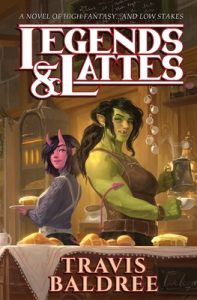 Escape Rating A+: Anyone who sunk straight into the cozy fantasy vibe of
Escape Rating A+: Anyone who sunk straight into the cozy fantasy vibe of 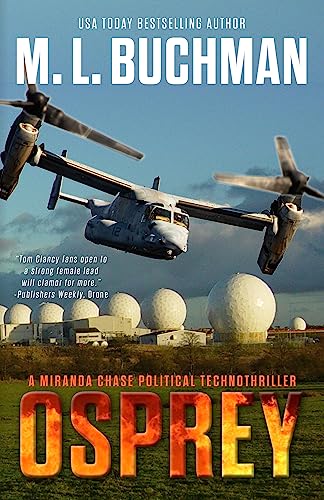 Osprey (Miranda Chase NTSB, #13) by
Osprey (Miranda Chase NTSB, #13) by 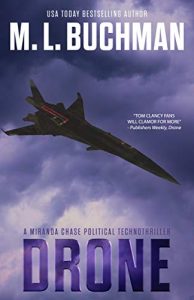 Escape Rating A+: This was one of those books that turned out to be a much harder read than I was expecting – even as it sucked me right in and wouldn’t let me go until the end. By saying Osprey is a ‘hard read’ I mean that in the sense that, 13 books into this series, I’ve become very fond of Miranda and her team and hate seeing any of them in serious distress. But it’s clear that this is the 13th book in the series for a reason in that it seems like all the bad luck and worse trouble in Miranda’s life comes home to roost in this one and probably won’t leave anytime soon.
Escape Rating A+: This was one of those books that turned out to be a much harder read than I was expecting – even as it sucked me right in and wouldn’t let me go until the end. By saying Osprey is a ‘hard read’ I mean that in the sense that, 13 books into this series, I’ve become very fond of Miranda and her team and hate seeing any of them in serious distress. But it’s clear that this is the 13th book in the series for a reason in that it seems like all the bad luck and worse trouble in Miranda’s life comes home to roost in this one and probably won’t leave anytime soon.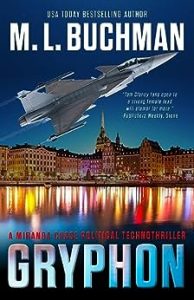 Let’s just say that on Miranda’s personal front, this is a heartbreaking story and it’s hard to watch her even begin to go through the inevitable fallout. Howsomever, as one of the strengths of this series is the way that the characters and relationships change and grow over time, Miranda’s situation is one that I expect to see explore and change and resolve over the next several books in the series, starting with
Let’s just say that on Miranda’s personal front, this is a heartbreaking story and it’s hard to watch her even begin to go through the inevitable fallout. Howsomever, as one of the strengths of this series is the way that the characters and relationships change and grow over time, Miranda’s situation is one that I expect to see explore and change and resolve over the next several books in the series, starting with  Into the Riverlands (The Singing Hills Cycle, #3) by
Into the Riverlands (The Singing Hills Cycle, #3) by 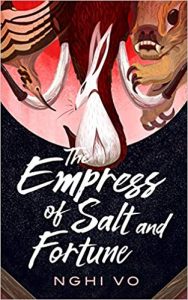 The entire
The entire 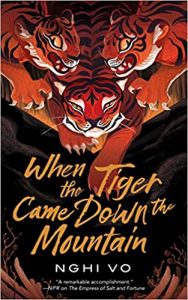 Escape Rating A+: At first, Into the Riverlands seems as if it’s a play on the Canterbury Tales, with Cleric Chih taking the place of Geoffrey Chaucer himself (who, come to think of it, by certain definitions was himself a ‘cleric’). Into the Riverlands is a journey, and every person in the party has at least one story to tell. It’s Chih’s duty to record those stories – not to become a part of one themselves.
Escape Rating A+: At first, Into the Riverlands seems as if it’s a play on the Canterbury Tales, with Cleric Chih taking the place of Geoffrey Chaucer himself (who, come to think of it, by certain definitions was himself a ‘cleric’). Into the Riverlands is a journey, and every person in the party has at least one story to tell. It’s Chih’s duty to record those stories – not to become a part of one themselves.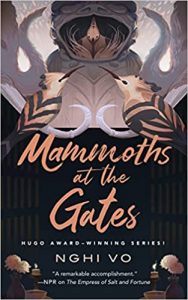 But, as I said in last week’s review of
But, as I said in last week’s review of 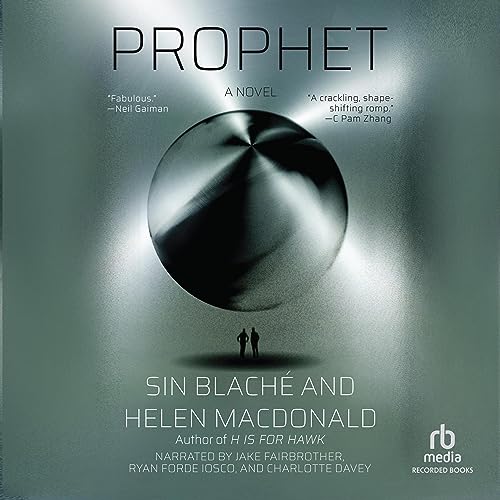 Prophet by
Prophet by 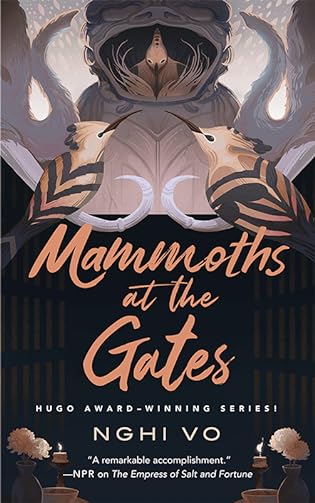 Mammoths at the Gates (The Singing Hills Cycle, #4) by
Mammoths at the Gates (The Singing Hills Cycle, #4) by  It’s also a heartbreakingly beautiful tale of a truth that sets no one free, and a love that both transcends and transforms death.
It’s also a heartbreakingly beautiful tale of a truth that sets no one free, and a love that both transcends and transforms death.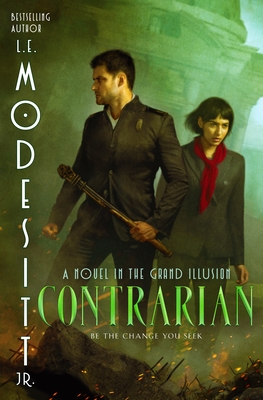 Contrarian (The Grand Illusion #3) by
Contrarian (The Grand Illusion #3) by 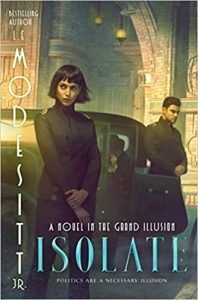 The first book in this series,
The first book in this series, 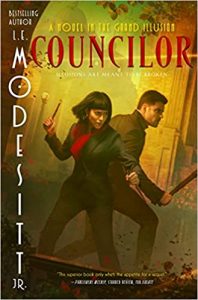 Escape Rating A+: This series is my catnip. I could read about Steffan’s work day, his colleagues, his attempts to maneuver around a great many of them, and the crises in his country that he tries to prevent, pretty much all day long.
Escape Rating A+: This series is my catnip. I could read about Steffan’s work day, his colleagues, his attempts to maneuver around a great many of them, and the crises in his country that he tries to prevent, pretty much all day long. 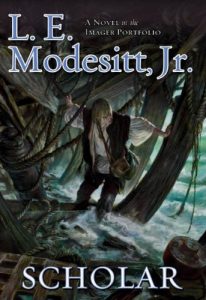 The progress of the series so far reminds me a lot of the author’s
The progress of the series so far reminds me a lot of the author’s